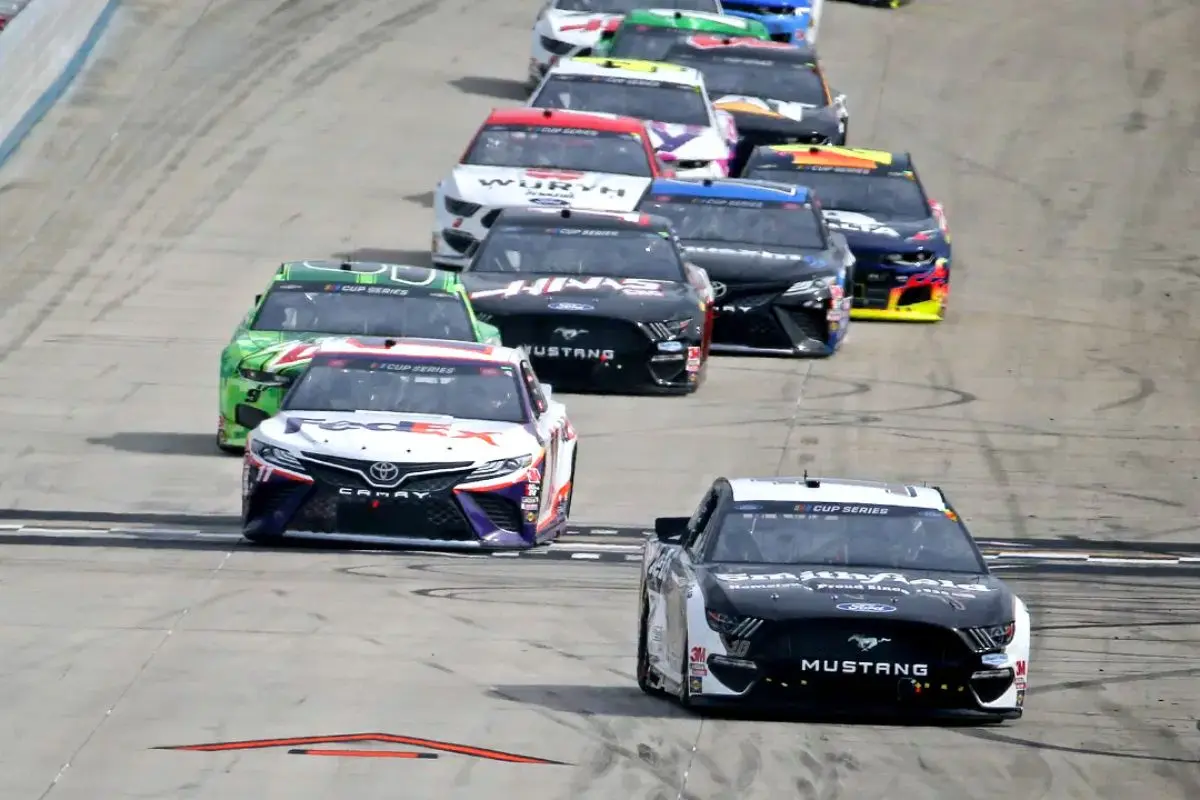NASCAR features some surprisingly unconventional rules that intrigue fans. The early 1991 pit stop rule, enacted for safety, led to tedious racing and was quickly repealed. The 250-mile rule limited official wins to longer races, impacting legendary drivers like Dale Earnhardt. Another fascinating regulation is that NASCAR owns all car numbers, requiring teams to apply for their use. Furthermore, no webbed gloves are allowed to maintain aerodynamic fairness. Curious fans will find even more unexpected rules within this dynamic sport.
Key Highlights
- The 250-Mile Rule made races under 250 miles unofficial, limiting drivers’ win totals and enhancing race prestige.
- NASCAR owns all car numbers, requiring teams to apply and pay for their desired number usage.
- The No Webbed Gloves Rule prohibits gloves with finger webbing, seen as an aerodynamic aid, to ensure fair competition.
- The “Lucky Dog” rule allows the first car one lap down to regain a lap during caution, altering race dynamics controversially.
- Paint scheme regulations restrict differing designs on car sides, maintaining uniformity while allowing limited variations front and rear.
Early 1991 Pit Stop Rule
Although the intention behind the Early 1991 Pit Stop Rule was to improve safety, its implementation led to a notable shift in the dynamics of NASCAR racing.
Introduced in response to the tragic death of a pit crew member, the rule prohibited tire changes during caution periods and mandated that cars received stickers to designate their pit eligibility. This measure aimed to prevent simultaneous pit stops in adjacent boxes, but it resulted in a lackluster racing experience.
Drivers were unable to strategize effectively, leading to a monotonous flow of events. By April 1991, the regulation was swiftly revoked, highlighting the delicate balance between safety protocols and the thrilling competitive spirit that defines NASCAR.
This illustrates how safety measures can inadvertently stifle race excitement.

The 250-Mile Rule
Following the modifications to pit stop regulations in the early 1990s, NASCAR continued to evolve its rules to shape the competitive landscape of racing.
One crucial change was the implementation of the 250-mile rule, which mandated that only races of this distance or longer would be counted as official wins. This policy, instituted after 1971, had notable implications for drivers’ records.
- Drivers like Dale Earnhardt saw their win totals dramatically reduced.
- The rule aimed to elevate the prestige of official victories.
- Eventually, the introduction of road and street courses led to the phasing out of this requirement.
This evolution reflects NASCAR’s ongoing commitment to maintaining a competitive and fair racing environment.
 NASCAR Cup Series Manufacturer Standings” width=”1200″ height=”800″ srcset=”https://slicksandsticks.com/wp-content/uploads/2025/03/NASCAR-Cup-Series-Manufacturer-Standings-1.webp 1200w, https://slicksandsticks.com/wp-content/uploads/2025/03/NASCAR-Cup-Series-Manufacturer-Standings-1-300×200.webp 300w, https://slicksandsticks.com/wp-content/uploads/2025/03/NASCAR-Cup-Series-Manufacturer-Standings-1-1024×683.webp 1024w, https://slicksandsticks.com/wp-content/uploads/2025/03/NASCAR-Cup-Series-Manufacturer-Standings-1-768×512.webp 768w, https://slicksandsticks.com/wp-content/uploads/2025/03/NASCAR-Cup-Series-Manufacturer-Standings-1-630×420.webp 630w, https://slicksandsticks.com/wp-content/uploads/2025/03/NASCAR-Cup-Series-Manufacturer-Standings-1-150×100.webp 150w, https://slicksandsticks.com/wp-content/uploads/2025/03/NASCAR-Cup-Series-Manufacturer-Standings-1-696×464.webp 696w, https://slicksandsticks.com/wp-content/uploads/2025/03/NASCAR-Cup-Series-Manufacturer-Standings-1-1068×712.webp 1068w” sizes=”auto, (max-width: 1200px) 100vw, 1200px” />
NASCAR Cup Series Manufacturer Standings” width=”1200″ height=”800″ srcset=”https://slicksandsticks.com/wp-content/uploads/2025/03/NASCAR-Cup-Series-Manufacturer-Standings-1.webp 1200w, https://slicksandsticks.com/wp-content/uploads/2025/03/NASCAR-Cup-Series-Manufacturer-Standings-1-300×200.webp 300w, https://slicksandsticks.com/wp-content/uploads/2025/03/NASCAR-Cup-Series-Manufacturer-Standings-1-1024×683.webp 1024w, https://slicksandsticks.com/wp-content/uploads/2025/03/NASCAR-Cup-Series-Manufacturer-Standings-1-768×512.webp 768w, https://slicksandsticks.com/wp-content/uploads/2025/03/NASCAR-Cup-Series-Manufacturer-Standings-1-630×420.webp 630w, https://slicksandsticks.com/wp-content/uploads/2025/03/NASCAR-Cup-Series-Manufacturer-Standings-1-150×100.webp 150w, https://slicksandsticks.com/wp-content/uploads/2025/03/NASCAR-Cup-Series-Manufacturer-Standings-1-696×464.webp 696w, https://slicksandsticks.com/wp-content/uploads/2025/03/NASCAR-Cup-Series-Manufacturer-Standings-1-1068×712.webp 1068w” sizes=”auto, (max-width: 1200px) 100vw, 1200px” />
NASCAR Owns All Car Numbers
While many racing series allow teams to freely choose and own their car numbers, NASCAR maintains a unique approach by owning the rights to all car numbers used in its events. Teams must apply to utilize a specific number and pay for its likeness, creating a distinctive dynamic in the sport.
- The iconic number 3, once associated with Dale Earnhardt, was unofficially retired after his death.
- Austin Dillon revived the number in 2014 after Richard Childress Racing secured a licensing agreement.
This system guarantees that NASCAR controls brand identity and prevents conflicts over number usage, emphasizing the sport’s commercial aspect.
NASCAR’s ownership of car numbers demonstrates the intricate intersection of tradition and commerce in professional racing.
No Webbed Gloves Rule
The “No Webbed Gloves Rule” is particularly relevant for drivers and teams seeking to maintain compliance with NASCAR’s stringent regulations on equipment modifications.
This rule gained attention after Joey Logano was disqualified during a qualifying session at Atlanta due to the use of modified gloves featuring webbing between the fingers. While seemingly insignificant, this modification was deemed an aerodynamic aid, contravening NASCAR’s regulations.
Consequently, Logano’s No. 22 Ford was relegated to the back of the grid, accompanied by a $10,000 penalty. This incident highlights the governing body’s commitment to maintaining a level playing field, reaffirming that even minor equipment alterations are strictly monitored.
Joey Logano’s entire glove was webbed last week pic.twitter.com/8rbhNvplCi
— Jenna Fryer (@JennaFryer) March 2, 2024
Paint Scheme and Lucky Dog Rules
NASCAR’s stringent regulations extend beyond car numbers to encompass paint schemes and race conduct.
Significantly, the rule prohibits differing designs on the left and right sides of a vehicle, although variations are permitted at the front and rear. This was exemplified during the 2014 Talladega race, where Terry Labonte’s No. 32 Ford initially sported a unique scheme for qualifying but required modifications for the race itself.
Furthermore, the “Lucky Dog” rule allows the initial car one lap down to regain a lap during caution periods, a measure introduced to improve safety by eliminating the practice of racing back to the flag.
While it promotes quicker emergency responses, critics argue it may unfairly advantage drivers who haven’t earned their positions.

News In Brief: 5 NASCAR Rules So Bizarre You Won’t Believe They Actually Exist
In conclusion, NASCAR’s unique set of rules reflects the sport’s rich history and its commitment to fairness and safety. From the quirky Early 1991 Pit Stop Rule to the restrictive No Webbed Gloves Rule, these regulations may seem bizarre, yet they serve distinct purposes within the competitive landscape. By owning all car numbers and implementing specific paint scheme guidelines, NASCAR guarantees a level playing field while nurturing team identity. Ultimately, these rules contribute to the sport’s enduring charm and complexity.
ALSO READ: The Ultimate Guide to NASCAR’s Cook Out Southern 500 Weekend!
